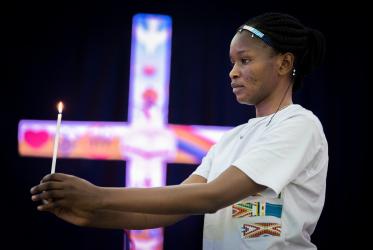By Michael Perreau*
This feature article provides a progress report from an essential movement within the broader fellowship of world Christianity.
Bible Societies are working in more than 200 countries and territories around the world to make known the Word of God. At the heart of the work – from the translation of Holy Scripture to publishing, distribution and advocacy, and engagement activities – is the principle of collaborating with and serving the churches. After reviewing the biblical imperative that shapes the work of Bible Societies, this article provides examples of ways in which Bible Societies support churches in their ministry.
Jesus came to them and said:
“I have been given all authority in heaven and on earth! Go to the people of all nations and make them my disciples. Baptize them in the name of the Father, the Son and the Holy Spirit, and teach them to do everything I have told you. I will be with you always, even until the end of the world.”
(Matthew 28:18-20, Contemporary English Version)
In the Great Commission, Jesus asserts his God-given power and then calls on all Christians, everywhere, to go out in this power to make known his Father’s love for all people. It is the vocation to fulfil the Great Commission that is the driving force of the Bible Society movement. The Bible Societies that are working in many diverse contexts around the world all understand their task as participation in the mission of God − Father, Son and Holy Spirit − as witnessed in the Scriptures.
This is a task that, from its very beginnings in the Great Commission, has required Christians to work together in a spirit of mutual respect. The vision of the Bible Society movement is to provide the Bible for everyone. This cannot be achieved without close collaboration with the churches. It is the churches, and their individual congregations, that are at the forefront of the mission to “go to the people”. From the founding of the very first Bible Society in 1804 in response to a Welsh vicar’s frustration at being unable to supply a Bible to a girl called Mary Jones, who was desperate to read God’s Word for herself, Bible Societies have existed to serve the practical and spiritual ministry of the churches.
Although the Bible Society movement had its origins in the Protestant churches and their mission movement, during the second half of the 20th century the Fellowship of Bible Societies developed into a Christian organization working with all churches worldwide. Today, Bible Societies partner with the traditional Protestant Churches, with the Catholic Church, with the Eastern Orthodox and Oriental Churches and with emerging churches. This inter-confessional dimension makes the work of Bible Societies unique.
Bible Societies’ service to the churches is undertaken in the universal spirit of the Great Commission. Working with all churches, Bible Societies seek to ensure that God’s Word can be made known to all who will hear it and become disciples.
Throughout the lifecycle of the Bible – from translation through production and distribution to various forms of engagement, holistic ministry and advocacy – the priority of Bible Societies is to provide resources to equip the churches and their partner organizations for this task.
One of the fundamental values of the Bible Society movement is that the churches are the primary agents of God’s mission in the world. Bible Societies aim to be a trusted and valued partner, always listening to what the churches need and striving to meet those needs in the most appropriate way.
In translating and distributing God’s Word, Bible Societies affirm that it belongs to all churches and recognize that its doctrinal interpretation belongs to them. Bible translations are made at the request of and according to the wishes of the churches. Many are undertaken by teams made up of representatives from a wide range of churches, others are undertaken for a specific confession. In all cases, the driving principle is to equip the churches with a suitable tool for their ministry. Our translation policy ensures we have translation guidelines that are acceptable to the Catholic, Protestant and Orthodox churches.
By partnering with Bible Societies, the churches benefit from the support of one of the world’s largest Christian organizations in terms of its global reach. Bible Society translation projects are based on world-leading technical and academic expertise, and it is through such projects that the majority of full Bible translations available today (which number around 550 languages, spoken by 4.9 billion people) have been produced.
All around the world, lives are being changed as people receive the Word of God in their language for the first time. In 2014 alone, Bible Societies assisted in completing first translations (full Bibles and New Testaments) in 30 languages spoken by nearly 10 million people. Including new or revised translations, Bible Societies assisted in 2014 in completing Scriptures with the potential to impact more than 1.37 billion people.
Many Bible Societies are now also making their Bible texts available digitally, thus equipping churches to meet the rapidly changing expectations of those they are seeking to reach today.
Since 1946, Bible Societies have been organized as United Bible Societies (UBS), a global fellowship. At very much the same time as the World Council of Churches came into being, the Bible Society movement, too, recognized that, more than ever before, practical steps towards Christian unity were vital. Through UBS, Bible Societies are able to engage with the churches in one voice.
In several cases there are formal agreements in place. For example, UBS has collaborated with the Catholic Bible Federation since 1969 and signed a Memorandum of Understanding with the Orthodox Churches in 2010. The leadership of UBS itself draws from a wide range of church backgrounds. On the ground, it is individual Bible Societies that engage locally with church leaders, listening to what they need in order to reach their own communities. This may be literacy materials, for example: many Bible Societies now have a range of such materials which are based on Bible stories and themes. Or it may be Scriptures for displaced people, or for those who have suffered other kinds of trauma. Or it may be a new or revised translation in a local language.
There were many such examples in 2015 alone. Several Bible Societies in Europe responded to requests for Scriptures in a range of languages from local churches offering practical and spiritual support to refugees. In Austria, the Bible Society supported the Orthodox Church in its youth ministry efforts by publishing and distributing a Bible intended for use in Orthodox religious education in schools, the first of its kind in any German-speaking country.
In Guatemala, a member of staff from the Bible Society literally stood side-by-side with the church when he and a local pastor were attacked when delivering audio Scriptures. In New Zealand, the Bible Society helped the Catholic Church to address the issue of social inequality through the launch of a Catholic edition of the Poverty and Justice Bible.
These and many other forms of Bible Society support for the various ministries of the churches demonstrate how Christians put into action the call contained in the Great Commission through a collaborative practice of faith and outreach.
Responding to this call, we have a bold vision: by 2022, we want to see two-thirds of people on the planet have access to the Bible in their chosen language, in their chosen medium, and in their chosen time and place. It is by working with and through the churches, in God’s power and grace, that we will seek to make this vision a reality.
*Michael Perreau is director general at United Bible Societies.








